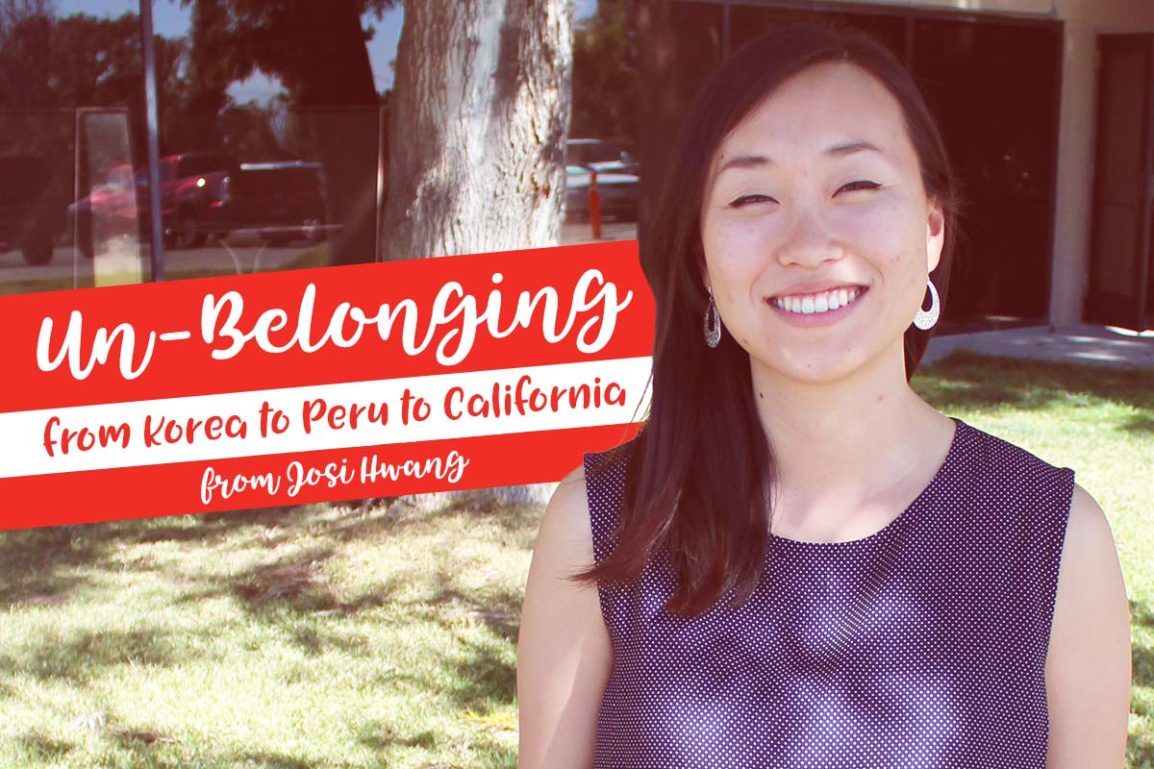My journey with God begins with the story of my family. The trajectory of our family life made a significant turn 31 years ago when my parents and sisters packed up and moved from Korea to Peru, South America. We went from being an average Korean family to becoming a Korean-Peruvian missionary family. During a time before the Internet and when smoking was still allowed on planes, they moved without knowing a single person in Peru, with a Bible in one hand and a dictionary in the other. God did not miss a beat, though, having prepared people – strangers – to receive them all along the way. God was already in Peru and our family was invited to join in the Kingdom work.
I was born not too long after this move when we were living in the mountains of Peru, so I narrowly missed the pain of moving to a new country. While my family adjusted to a new life, language, and culture, I grew up in the only life I have known. When people ask me what it was like to grow up as a missionary kid, I usually respond that it was pretty normal. There was also the aspect of switching between languages, toggling cultures, eating Peruvian food for lunch and Korean food for dinner, and spending half of my life in church. But that was normal life for us.
I loved much of it, but being different was not always easy. Peru in the 1980s and 90s was marked by terrorism and much political tumult. I feared that our family would be targeted because my parents were foreign religious workers. Starting in late elementary school, I checked, double checked, and triple checked the locks in our house before going to bed. We heard news of missionaries that had been threatened, kidnapped, and asked to leave the country. I feared we could be next. Even at a young age, I sensed that we were not always safe on the street – no one really was, but being different did not help.
Being different also impacted my identity. Just like any other kid I wanted to blend in with my peers, but looking Korean and having missionary parents made me a foreigner in their eyes. Strangers complimented me on my Spanish and close friends asked me when I would be “moving back home.” Life in Peru was the only life I knew, but I was not allowed to belong. To them, I was entirely Korean. They even thought, “Who would want to be Peruvian anyway?”
God had all along been inviting me to partner in Kingdom work, to put down roots where I was least expected, to cast my lot with those who believe I do not belong. Through this I believe that, in the same way God met me in my un-belonging, my un-belonging will draw others to find their belonging in God’s Kingdom.
I questioned God, wondering why God had wished this for me. I felt like a casualty. Somehow I was the cost of God’s expanding Kingdom across cultures and languages. Though God had done wondrous things in my parents’ ministries, I had fallen by the wayside. People said it was a blessing to be multicultural, however un-belonging felt more like a curse to me. It followed me everywhere. Even in Korea I did not belong. Though I looked like everyone else, on the inside I was also Peruvian and American. Though I desperately longed to belong somewhere, it seemed that I did not belong anywhere and I could not escape.
Then God, in kindness and faithfulness, began to meet me in scripture through Israel’s exile narratives. I felt like an exile, forced to wander without ever belonging. I met God there in my un-belonging. With nowhere to go, I turned to the one I already belonged to – the one with whom I rightfully belonged. I learned that all other founts were broken cisterns, unable to hold water. I would not find belonging anywhere else but in the one fountain of living water. I was called to un-belonging so that I might forever know my belonging to God.
When I began to embrace this, I sensed God calling me back to Peru through the letter to the exiles in Jeremiah 29: “Build houses and settle down; plant gardens and eat what they produce … Increase in number there; do not decrease. Seek the peace and prosperity of the city to which I have carried you into exile. Pray to the Lord for it, because if it prospers, you too will prosper.”
I was not a casualty in God’s plans. God had all along been inviting me to partner in Kingdom work, to put down roots where I was least expected, to cast my lot with those who believe I do not belong. Through this I believe that, in the same way God met me in my un-belonging, my un-belonging will draw others to find their belonging in God’s Kingdom.
In the meantime, as I finish up my degrees in clinical psychology and theology at Fuller Theological Seminary, I have found a community who lives by a similar vision in La Fuente Ministries. La Fuente’s multicultural, multilingual, and multigenerational community has been a nurturing family. Weekly I am challenged to put my hope in Christ and to see the redemptive work that God through the Spirit is doing in our midst. Additionally, I am being deeply nourished by La Fuente’s commitment to pursue social justice and Kingdom ethics in our local communities. At La Fuente, slowly but surely, we are building houses, planting gardens, increasing, and seeking the peace of Los Angeles. It is a joy to be part of such a community.
– Josi Hwang
Share this Article

